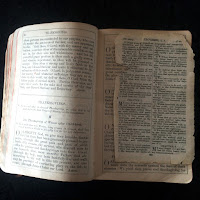The Lord Archbishop of Canterbury
Primate of All England
Lambeth Palace, London, SE1 7JU
Your Grace:
Many of us in the Episcopal Church first greeted the news of the upcoming Lambeth Conference with great excitement. When I was in England this past summer and visited Canterbury for the first time, I was deeply moved by the palpable bonds of kinship and affection created by our shared belonging to the Anglican Communion. I felt incredibly proud and connected. It was with great sadness and distress, therefore, that I read the recent statement from Dr. Josiah Idowu-Fearon, Secretary-General of the Anglican Communion, announcing that same-sex spouses of active bishops would not be invited to attend the 2020 Lambeth Conference along with opposite-sex spouses.
I am, of course, keenly aware that not all Anglicans are of the same mind on issues of human sexuality, as well as a wide range of other issues. We are living in an age, however, in which the Church stands largely discredited among the people to whom we are called to bring the Gospel of Jesus Christ. Having often found ourselves on the wrong side of history, the Church has developed a reputation for being prejudiced, retrograde, and oppressive, a reputation that, I fear, is well justified. How are we to look people in the eye and say that our God is a God of love, and the Bible is the divinely inspired container of God’s loving Word, when the leaders of the Anglican Communion countenance and perpetuate the homophobia and discrimination that hurts so many LGBTQ members of our Christian family? How are we to defend the Church against the legitimate claims of outmoded and pharisaical legalism?
I know that you, like I, take seriously St. Paul’s affirmation in his Epistle to the Galatians (Gal. 3:28-29) that “there is no longer Jew or Greek, there is no longer slave or free, there is no longer male and female; for all of you are one in Christ Jesus. And if you belong to Christ, then you are Abraham’s offspring, heirs according to the promise.” Are LGBTQ people not also heirs of Christ’s promise, Your Grace? I came to the Episcopal Church in 2004 after having wandered for twenty years in a spiritual wilderness following a traumatic departure from the Judaism of my upbringing. I fell in love with the Anglican form of Christianity, because I witnessed in Holy Scripture and experienced in the embodied life of the Church a Jesus who loved and fully included the poor, the marginalized, and the rejected without any qualification and in defiance of the religious and civil authorities of his time. And I fell so in love with Jesus that I have dedicated my life to him as a priest.
The Sunday lectionary recently included the Sermon on the Plain from the Gospel of Luke, in which Our Lord says, “blessed are you when people hate you, and when they exclude you, revile you, and defame you on account of the Son of Man. Rejoice in that day and leap for joy, for surely your reward is great in heaven; for that is what their ancestors did to the prophets” (Lk 6:22-23). Our Lord did not judge us worthy of being hated, excluded, or reviled. Must we wait for heaven to see our Lord’s promise of inclusion fulfilled? Are we to be bullied, as the prophets were, by people who are ignorant and frightened by the ongoing revelation of God’s truth, as Our Lord said in the Gospel of John:
“I still have many things to say to you, but you cannot bear them now. When the Spirit of truth comes, he will guide you into all the truth; for he will not speak on his own, but will speak whatever he hears, and he will declare to you the things that are to come” (John 16:12-13).
God is speaking to the world; but many do not want to listen. As the spiritual head of the world’s 85 million Anglicans and Episcopalians, Your Grace, please guide me: what am I to tell my flock? When the chips are down, and we have to choose what is just and what is expedient, how am I supposed to defend the Anglican Communion? Must I tell my LGBTQ folks that Cantuar believes them to be expendable, or will I be able to say with pride that you and other Anglican leaders stood up for them? I hold out the deepest hope that you will take a courageous stand and echo the resolute words of the Most Rev’d Edmond Lee Browning, 24th Presiding Bishop and Primate of the Episcopal Church, who said “I want to be very clear – this church of ours is open to all – there will be no outcasts – the convictions and hopes of all will be honored.”
I have great compassion for the very difficult situation in which your find yourself, Your Grace, in trying to keep the Anglican Communion together, as did your predecessors in office. I will pray for you in love for the formidable vocation which has been entrusted to you, as I hope you will pray and advocate for all those who have been materially harmed by the Church’s exclusionary policies. With this in mind, I implore you to consider adopting the fairer and more equitable policy of inviting no spouses of active bishops to the Lambeth Conference, if you do not feel you can invite the same-sex spouses. This would at least mitigate the sting of our continued exclusion from full membership in the Church at the highest levels. It would remind me and others of why we are still proud to be Anglicans.
I thank you, Your Grace, for your consideration of my comments. I wish you and all of our family in the Church of England and the Anglican Communion a transformative Lent.
Your humble servant in Christ,
The Rev’d Ethan Alexander Jewett, SCP
VIII Rector, St. Helena’s Episcopal Church, Burr Ridge, Illinois
Episcopal Diocese of Chicago
The Episcopal Church








